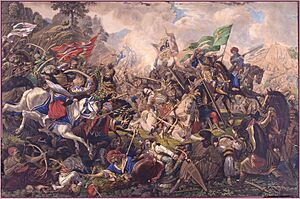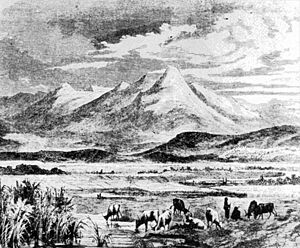Battle of Breadfield facts for kids
Quick facts for kids Battle of Breadfield |
|||||||
|---|---|---|---|---|---|---|---|
| Part of the Ottoman–Hungarian Wars | |||||||
 Battle of Breadfield by Eduard Gurk |
|||||||
|
|||||||
| Belligerents | |||||||
| Ottoman Empire | |||||||
| Commanders and leaders | |||||||
| Paul Kinizsi Stephen V Báthory Bartholomew Drágfi Vuk Grgurević-Branković Dmitar Jakšić Basarab Laiotă cel Bătrân |
Ali Bey | ||||||
| Strength | |||||||
| 12-15,000 men (Hungarians, Székelys, Transylvanian Saxons, Serbs, Poles, Transylvanian Vlachs) | Around 30,000 men consisting of Akıncı, Sipahi and Azaps, and some Janissary 1,000-2,000 Wallachian mercenaries |
||||||
| Casualties and losses | |||||||
| 3,000 killed | 5,000-9,000 Ottomans killed 1,000 Wallachian |
||||||
The Battle of Breadfield was a huge fight in Transylvania on October 13, 1479. It happened near a village called Alkenyér, next to the Maros River. This battle was part of the Ottoman–Hungarian Wars.
The Hungarian army was led by important generals like Pál Kinizsi and Stephen V Báthory. The battle ended with a big win for the Kingdom of Hungary and their allies, the Serbian Despotate.
Contents
Why the Battle Happened
Ottoman Raids in Transylvania
From 1458, King Matthias of Hungary often fought against the Ottoman Turks. In 1463, he took control of parts of Bosnia. However, this was not a full-scale war.
Between 1474 and 1475, Turkish raiding parties attacked Transylvania and Vojvodina many times. These attacks caused some areas to lose people. Many villages were left empty as people moved away.
Ottoman Army Gathers
After a war between the Ottomans and Venice ended in 1479, a large Ottoman army gathered. This army was mostly made up of Akıncıs, who were Ottoman raiders.
When King Matthias heard about this, he ordered his generals to get ready. He told Stephen V Báthory, the leader of Transylvania, and General Pál Kinizsi to prepare their forces.
Turks Enter Transylvania
On October 9, the Ottoman army entered Transylvania. Their leader was Ali Koca Bey. The Akıncıs attacked villages and towns, taking many Hungarians, Vlachs, and Saxons as prisoners.
By October 13, Koca Bey set up his camp in a place called the Breadfield. A Wallachian prince named Basarab cel Tânăr had pushed Koca Bey to start this campaign. This prince also brought 1,000 to 2,000 of his own soldiers to help the Ottomans.
While the Turks continued to raid and take prisoners, Báthory and Kinizsi got their army ready to fight them.
The Armies: Who Fought?
Ottoman Forces
Historians disagree on how many soldiers the Ottoman army had. Some thought there were 60,000, while Hungarian records said about 30,000. One Polish writer even claimed 100,000.
However, King Matthias himself wrote that there were about 43,000 to 45,000 Ottoman and Wallachian soldiers. A more likely number for the Ottoman forces was between 6,000 and 20,000 soldiers, plus 1,000 to 2,000 Wallachians.
The Ottoman army was mostly made up of Akıncıs (raiders), Spakhs (cavalry), and Azaps (light infantry). They also had some Janissaries, who were elite Ottoman soldiers. This was not a full war, but a very big raiding trip. It was the largest raid Transylvania had seen in a hundred years of fighting between Hungary and the Ottomans.
Hungarian Forces
Kinizsi's army included soldiers from Hungary, Szeklers, Serbians, and Transylvanian Saxons. There were also some Vlach volunteers. These Vlach volunteers were led by Basarab Laiotă "the Elder." He was a former ruler of Wallachia and a rival of Basarab "the Younger," who was helping the Ottomans.
The Christian forces combined had about 12,000 to 15,000 men. Some people believe that soldiers from Poland, Moldova, Russia, Lithuania, Germany, and Bohemia also took part. But it is hard to prove this for sure.
The Battle Begins
Hungarian Strategy
The Turkish army started raiding Hungary on October 9. Báthory waited for the Turks to get tired from marching and raiding. He also waited until they had collected so much loot that they could not move quickly. Then, on October 13, he attacked them.
Both armies were divided into three parts. General Kinizsi led the right side of the Hungarian army. The left side had Serbian light cavalry, led by Vuk Grgurević and Demetrius Jakšić. Báthory's forces and the Saxons were in the middle.
On the Ottoman side, Koca Bey led the left. Isa Bey was in the middle, and Malkoch Oglu led the right side.
Key Moments in the Fight
The battle started in the afternoon. At one point, Báthory fell from his horse. The Ottomans almost captured him. But a brave nobleman named Antal Nagy quickly helped the leader escape.
At first, the Ottomans seemed to be winning. But then Kinizsi attacked the Turks with his Hungarian heavy cavalry. He was joined by 900 Serbs under Jakšić and many of the king's own soldiers. This forced Ali Bey to retreat.
Kinizsi then moved to attack the middle of the Turkish army. Soon, Isa Bey also had to pull back. The few Turks who survived the terrible fight ran into the mountains. Most of them were then killed by the local people. Pál Kinizsi was the hero of this battle. He was a legendary Hungarian general, known for his incredible strength. He served Matthias Corvinus in his famous Black Army of Hungary.
What Happened After
High Ottoman Losses
The Ottoman army suffered huge losses. Several thousand men were killed. Among them were Malkoçoğlu and Isa Bey, along with two other important Ottoman leaders. About a thousand of their Wallachian allies also died.
The Hungarian forces lost about 3,000 men in the battle. Some prisoners were set free, and the money paid for their release was very large.
Lasting Impact
In 1480, Kinizsi raided Serbia and defeated Ali Koca Bey several times. The Battle of Breadfield was a great win for the Hungarians. It gave them a strong feeling of confidence. Because of this victory, the Ottoman Turks did not attack southern Hungary and Transylvania for many years.
See also
- List of battles 1301–1600
- Breadfield


